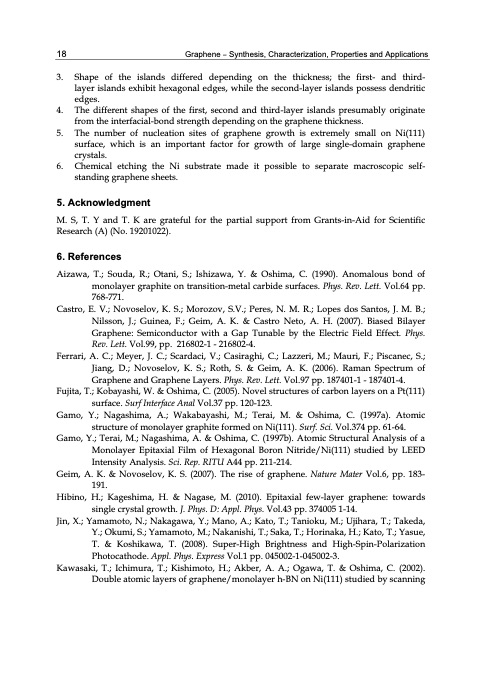PDF Publication Title:
Text from PDF Page: 028
18 Graphene – Synthesis, Characterization, Properties and Applications 3. Shape of the islands differed depending on the thickness; the first- and third- layer islands exhibit hexagonal edges, while the second-layer islands possess dendritic edges. 4. The different shapes of the first, second and third-layer islands presumably originate from the interfacial-bond strength depending on the graphene thickness. 5. The number of nucleation sites of graphene growth is extremely small on Ni(111) surface, which is an important factor for growth of large single-domain graphene crystals. 6. Chemical etching the Ni substrate made it possible to separate macroscopic self- standing graphene sheets. 5. Acknowledgment M. S, T. Y and T. K are grateful for the partial support from Grants-in-Aid for Scientific Research (A) (No. 19201022). 6. References Aizawa, T.; Souda, R.; Otani, S.; Ishizawa, Y. & Oshima, C. (1990). Anomalous bond of monolayer graphite on transition-metal carbide surfaces. Phys. Rev. Lett. Vol.64 pp. 768-771. Castro, E. V.; Novoselov, K. S.; Morozov, S.V.; Peres, N. M. R.; Lopes dos Santos, J. M. B.; Nilsson, J.; Guinea, F.; Geim, A. K. & Castro Neto, A. H. (2007). Biased Bilayer Graphene: Semiconductor with a Gap Tunable by the Electric Field Effect. Phys. Rev. Lett. Vol.99, pp. 216802-1 - 216802-4. Ferrari, A. C.; Meyer, J. C.; Scardaci, V.; Casiraghi, C.; Lazzeri, M.; Mauri, F.; Piscanec, S.; Jiang, D.; Novoselov, K. S.; Roth, S. & Geim, A. K. (2006). Raman Spectrum of Graphene and Graphene Layers. Phys. Rev. Lett. Vol.97 pp. 187401-1 - 187401-4. Fujita, T.; Kobayashi, W. & Oshima, C. (2005). Novel structures of carbon layers on a Pt(111) surface. Surf Interface Anal Vol.37 pp. 120-123. Gamo, Y.; Nagashima, A.; Wakabayashi, M.; Terai, M. & Oshima, C. (1997a). Atomic structure of monolayer graphite formed on Ni(111). Surf. Sci. Vol.374 pp. 61-64. Gamo, Y.; Terai, M.; Nagashima, A. & Oshima, C. (1997b). Atomic Structural Analysis of a Monolayer Epitaxial Film of Hexagonal Boron Nitride/Ni(111) studied by LEED Intensity Analysis. Sci. Rep. RITU A44 pp. 211-214. Geim, A. K. & Novoselov, K. S. (2007). The rise of graphene. Nature Mater Vol.6, pp. 183- 191. Hibino, H.; Kageshima, H. & Nagase, M. (2010). Epitaxial few-layer graphene: towards single crystal growth. J. Phys. D: Appl. Phys. Vol.43 pp. 374005 1-14. Jin, X.; Yamamoto, N.; Nakagawa, Y.; Mano, A.; Kato, T.; Tanioku, M.; Ujihara, T.; Takeda, Y.; Okumi, S.; Yamamoto, M.; Nakanishi, T.; Saka, T.; Horinaka, H.; Kato, T.; Yasue, T. & Koshikawa, T. (2008). Super-High Brightness and High-Spin-Polarization Photocathode. Appl. Phys. Express Vol.1 pp. 045002-1-045002-3. Kawasaki, T.; Ichimura, T.; Kishimoto, H.; Akber, A. A.; Ogawa, T. & Oshima, C. (2002). Double atomic layers of graphene/monolayer h-BN on Ni(111) studied by scanningPDF Image | GRAPHENE SYNTHESIS CHARACTERIZATION PROPERTIES

PDF Search Title:
GRAPHENE SYNTHESIS CHARACTERIZATION PROPERTIESOriginal File Name Searched:
Graphene-Synthesis.pdfDIY PDF Search: Google It | Yahoo | Bing
Salgenx Redox Flow Battery Technology: Power up your energy storage game with Salgenx Salt Water Battery. With its advanced technology, the flow battery provides reliable, scalable, and sustainable energy storage for utility-scale projects. Upgrade to a Salgenx flow battery today and take control of your energy future.
CONTACT TEL: 608-238-6001 Email: greg@infinityturbine.com (Standard Web Page)